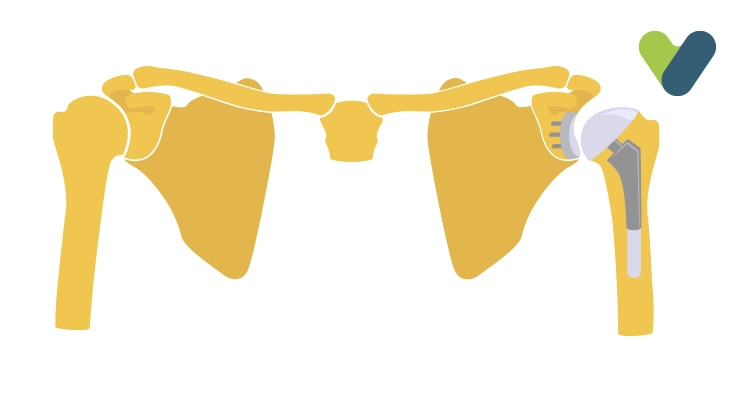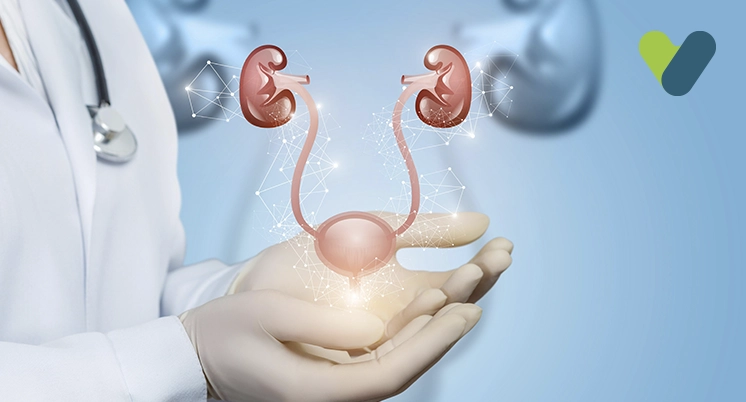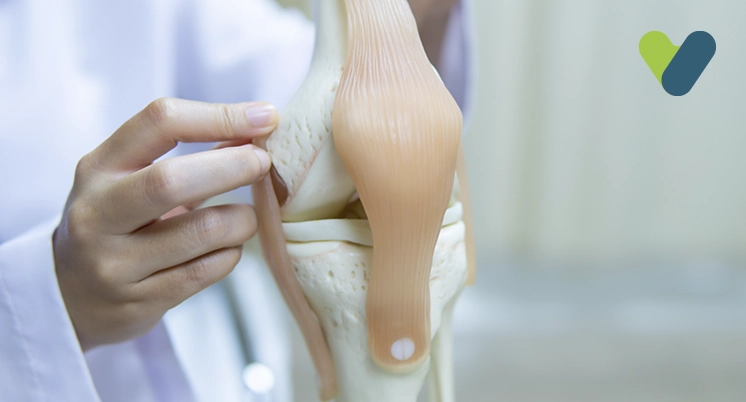About the shoulder joint
The shoulder joint is a ball-and-socket joint that connects the upper arm to the body. The rounded head of the arm bone humerus articulates into the socket, which is located at the base of the shoulder blade.
It is held together by ligaments and tendons. Ligaments connect bone to bone, whereas tendons connect muscle to bone. The bones are separated by a tissue layer called cartilage, which prevents them from rubbing against each other. This ball-and-socket type of joint enables the arm to move in almost all directions.
What is shoulder replacement surgery?
A shoulder replacement operation is a complex surgical procedure that replaces certain parts of the shoulder joint that are damaged with artificial components known as implants or prostheses so as to remove the root cause of pain and dysfunction. The procedure is designed to alleviate the pain, enhance strength, expand the movement range, and restore the ability to use the arm and shoulder.
Why would one need a shoulder replacement?
People may need it if they suffer from an ailment that hampers their use of their arm and causes pain, including:
- Severe arthritis
- A severe shoulder injury (e.g., a bone fracture)
- A rotator cuff tear
- Rheumatoid arthritis
- Avascular necrosis
At first, the doctor will most likely attempt to manage patients with prescription medications or physical therapy. If these do not work, they may suggest surgery.
What are the different types of shoulder replacement surgery?
Shoulder replacement surgery has three types. The doctor may suggest either of the following types of shoulder replacements, depending on what kind of joint damage individuals have:
- Total shoulder replacement: This type of surgical procedure is also called total shoulder arthroplasty and is the most commonly performed type. It replaces the ball that is present at the top of the arm bone humerus with a metal ball that is connected to the remainder of the bone, and the socket is covered with a plastic surface.
- Partial shoulder replacement: Only the ball of the humerus is replaced in a partial shoulder replacement.
- Reverse shoulder replacement: This is usually performed if someone has a rotator cuff tear. It can also be used if other types of shoulder replacement surgery have failed. The ballandsocket are both substituted; however, the implants are switched. The metal ball is connected to the shoulder bone, and a socket is inserted into the top of the arm.
Why is shoulder replacement surgery done?
A shoulder replacement procedure can help alleviate pain and clear away any symptoms caused by shoulder joint damage. The following conditions can be associated with harm to the shoulder joint:
- Osteoarthritis: Osteoarthritis, also called wear-and-tear arthritis, affects the cartilaginous tissue that supports the ends of bones and allows joints to move smoothly.
- Fractures: The head (upper end) of the arm bone humerus may get fractured due to an injury or when previous fracture fixation procedures have failed.
- Rheumatoid arthritis, in addition to other inflammatory conditions: These conditions, which are a result of a hyperactive immune system, can damage the cartilage and, in certain cases, the bone underlying the joint.
- Injuries to the rotator cuff: The rotator cuff is a bundle of tendons and muscles surrounding the shoulder joint. Rotator cuff injuries can sometimes cause bone and cartilage damage in the joint.
- Osteonecrosis: Certain conditions can impact the blood flow to the humerus, leading to a bone collapse due to a lack of blood supply.
What are the risks of shoulder replacement surgery?
Although relatively rare, it can happen that the shoulder replacement surgery does not alleviate or eliminate the pain. The surgery may not completely restore the joint's movement or strength. In such cases, another surgery might be necessary.
The following are some of the possible side effects of shoulder replacement surgery:
- Fracture: During or after surgery, the scapula, humerus, or glenoid bone may break.
- Dislocation: It is possible that the ball of the new joint will fall out of its socket.
- Rotator cuff tear: The rotator cuff is a bunch of muscles and tendons that envelop the shoulder joint; it can sometimes wear out following a total or partial anatomic shoulder replacement.
- Loosening of the implant: Shoulder replacement implants are long-lasting, but they can become loose or worn over time. In certain cases, additional surgery may be necessary to replace the loose elements.
- Infection: Infection can develop at the site of the incision or in deeper tissue, and surgery might be needed sometimes to treat it.
- Damage to the nerves: Nerves in the proximity of the implant can be damaged, which results in numbness, pain, and weakness.
- Blood clots: Following surgery, there is sometimes a chance of clot formation in the veins of the arm or leg. This can be fatal if a clot breaks off and moves to the lung, heart, or, in rare cases, the brain.
What if the shoulder replacement operation is delayed?
If the shoulder replacement is pushed back, individuals may observe the following symptoms:
- If left untreated, severe pain in the shoulder may result in inflammation and swelling.
- One can notice restricted shoulder movements.
- Pain-relieving medications, including acetaminophen and ibuprofen, are no longer be effective in relieving the pain.
- Because of the constant pain in the shoulder, the quality of life degrades as people may not be able to participate in the activities they used to.
- Individuals develop severe issues, including ankylosing spondylitis, rheumatoid arthritis, and other inflammatory disorders.
What should one expect before a shoulder replacement surgery?
- The doctor will instruct you not to drink or eat anything before the surgery.
- The doctor will advise patients to discontinue taking certain medications, like blood thinners, NSAIDs, and arthritis treatments.
- One should dress comfortably and wear a button-up shirt, preferably.
- The doctor will instruct you not to drink or eat anything before the surgery.
- The doctor will inquire about the drug allergies and medical history.
- The doctor will inform patients about the type of anaesthesia they will receive during surgery.
- Individuals will be advised not to put any strain on their shoulders.
What can one expect on the day of the shoulder replacement surgery?
- The nurse will document and organise the test results.
- In the presence of the family, the surgeon will request that the patient complete the consent form.
- Before the surgery, one must fast for a minimum of six hours.
- Patients will be instructed to take off their clothes and put on a hospital gown prior to the surgery.
- One’s vital signs will be recorded, and they will be transferred to the OT.
What can one expect during the shoulder replacement surgery?
- Based on the type of shoulder replacement surgery, the surgery will last approximately 2 hours.
- Throughout the procedure, individuals will be under general or regional anaesthesia.
- The metal ball will be used to replace the shoulder's damaged joint ball. A glenoid, a plastic surface, will also be placed on the shoulder socket.
- Throughout the procedure, the patient's vital signs and other functions of the body will be monitored.
- After the procedure is successfully completed, the patient will be shifted to the recovery room until they regain consciousness.
What is the recovery and post-operative care process after shoulder replacement surgery?
When the patient's vital signs stabilise, they will be transferred to a hospital room.
- Patients will be required to be admitted to the hospital following their surgery for about 2–3 days.
- For the initial 2–6 weeks, the arm will be strapped into a sling to protect and support the shoulder.
- Staples or sutures will be placed along the wound or beneath the skin. A few weeks after the surgery, those staples would be removed.
- Sutures that dissolve do not need to be removed.
- Once the patient gets home, they should refrain from soaking in water.
- Patients should keep bandaging the wound to prevent irritation from clothes.
- Individuals will be advised to refrain from driving, heavy lifting, and other activities for at least 2–3 weeks following the procedure.
- Following the surgery, the patient will be given pain medication. Antibiotics will also be given to prevent infection of the wound. The first follow-up appointment
- The first appointment will be around 2–4 weeks following the surgery.
- The doctor will take out the staples from the wound and advise a few blood tests and shoulder X-rays before deciding on the medication based on the condition.
- If the patient is experiencing any pain or discomfort, they should consult the doctor right away.
- The doctor will advise the patient on future timely follow-ups.
- The doctor will guide the patient through a few exercises to help maintain blood circulation to the shoulder.
When should one see a doctor post-surgery?
Your doctor will schedule a follow-up appointment after your surgery. However, if you experience any out of the ordinary symptoms, like the ones listed below, seek immediate medical attention:
- Bleeding that does not stop despite applying pressure to the affected area.
- Pain that persists despite pain medication.
- Having arm swelling
- Tingling and numbness in the hand and fingers.
- The colour of the fingers and hands changes.
- A fever, swelling, redness, pain, or yellowish discharge (pus) from the wound
- Any side effects as a result of the medication.
What is the shoulder replacement surgery cost in India?
Several factors have a direct impact on the cost of shoulder replacement surgery. Consider the important factors that influence the overall cost of shoulder replacement surgery in India:
- Diagnostic Tests and Consultation Fee for Shoulder Replacement Surgery
- The admission fees
- Experience of the surgeon operating
- Implants used for the surgery
- The patient's medical condition and age
- City
- the hospital where the surgery is performed
- the hospital room selected
It is worth noting that certain private clinics and hospitals in India may demand higher fees for the surgery, whereas government hospitals may charge lower fees. Discuss the costs and alternatives with the surgeon and hospital to have a clear understanding of the expenses involved.
Takeaway To summarise, shoulder replacement surgery is a complex surgical procedure in which a damaged shoulder joint is replaced with an artificial implant. Patients who experience severe pain in the shoulder, stiffness, and a restricted range of motion as a result of injury, arthritis, or any other shoulder conditions should consider this surgery.
It is essential to remember that shoulder replacement surgery is not appropriate for everyone, and patients should consult with their doctor to determine their eligibility.
Patients should also carefully follow their doctor's post-operative care instructions to ensure a speedy recovery and long-term benefits from the surgery. All in all, shoulder replacement surgery could improve the quality of life of patients who have severe shoulder conditions and is a viable option for them.


